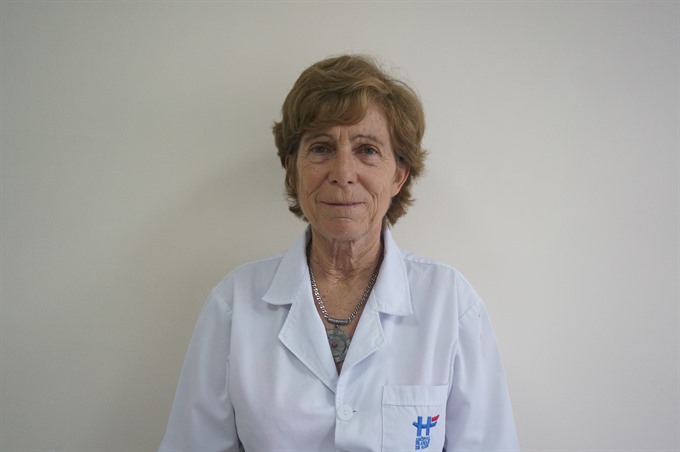 Life & Style
Life & Style

Does your child have itchy, red skin? She or he might be suffering from Atopic Dermatitis. Atopic Dermatitis (A.D.) is an inflammatory chronic eczematous disease of the skin and the most common type of eczema.
 |
| Dr. Nelly Gerard. — Photo courtesy of Hanoi French Hospital |
by Dr. Nelly Gerard*
Does your child have itchy, red skin? She or he might be suffering from Atopic Dermatitis.
Atopic Dermatitis (A.D.) is an inflammatory chronic eczematous disease of the skin and the most common type of eczema.
It is not a contagious disease. It usually begins in childhood but can also affect adults.
The exact causes of A.D. are not known. They combine a predisposition to A.D., often inherited; immune system and environmental factors; as well as the disturbance of good intestinal and skin bacteria. The condition can become more serious through abuse of antibiotics.
A.D. is often associated with asthma and has fever. It affects 10 to 20 per cent of children in Europe and in the United States. The percentage of affected children has been rapidly increasing in developing countries as well, more so in cities than in rural areas.
A.D. is often mixed up with Allergic Contact Eczema; which is an allergic reaction against a substance or product that manifests as eczema. In some circumstances, a child can have both types at the same time.
How to recognise Atopic Dermatitis
Your child’s skin is:
The skin also shows redness, very small blisters, weeping, cracking and crusting.
The skin areas affected can be the cheeks, the arm folds, the back of knees, cracks behind the ears, but can really be anywhere on the body.
It predominantly affects infants and young children, usually beginning before the age of six months, and occasionally adults.
Treatment
It can be aggravated by:
- In summer, sweating causes itching
- In winter, cold weather dries the skin
Bacteria, viruses, fungi (impetigo, herpes…)
Seasonal pollen, dust mites, animal dander and mold.
It is very important that you take due care of your child’s skin, protecting and hydrating it daily by:
Recently, the use of probiotics (lactobacillus…) found in probiotic yoghurt has proven to be very efficient in avoiding flare ups.
In case of a flare up your doctor may prescribe some of the following:
In case of severe A.D. and after specialist advice only, the following drugs can be prescribed
In conclusion, Atopic Dermatitis is known as a long term disease. Although it is a very uncomfortable disease for your child it can be successfully managed with cooperation of the child, the family and the doctor.
To repeat, don’t forget simple things like daily moisturising and avoiding triggers can help your child get through Atopic Dermatitis comfortably.
*Dr. Nelly Gerard is a French specialist in Dermatology & Venereal Diseases who has recently joined the Hanoi French Hospital, bringing her expertise to our customers and colleagues.
If you want to learn more about eczema or how to treat your child, please contact us at 84 – 24 3577 1100, access www.hfh.com.vn, or email us at contact@hfh.com.vn. Address: 1 Phương Mai, Đống Đa, Hà Nội